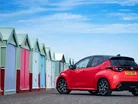Toyota's Electric Vehicle Mobility Roadmap

Toyota recently shared its Integrated Report 2023, providing data on its electric vehicle development, mobility concepts and goals.
To meet the wide range of customer needs, Toyota is strengthening its development to increase the number of plug-in hybrid vehicle options, by positioning them as “practical Battery EVs” while also expanding sales of hybrid vehicles.
“In terms of mobility, we will offer a range of solutions under our multi-pathway strategy to provide options to our customers worldwide,” said President Koji Sato.
Toyota’s Battery Electric Vehicles (BEVs)
In 2026, Toyota plans to release its next-generation BEVs, which will double driving range by using more efficient batteries and also offer design and driving performance to ‘set hearts racing’.
In response to the rising need for carbon neutrality, Toyota will continue to decarbonise its supply chain and manufacturing operations.
Toyota will continue to work on reducing the negative impact that cars can have on society, such as pollution and city congestion, while heightening the benefits of sustainable mobility.
“To this end, we aim to transform ourselves into a mobility company by leveraging our foundation of ‘making ever-better cars’ a desire expressed through the phrase ‘let’s change the future of cars’,” added Sato. “We are taking on multifaceted challenges based on the Toyota mobility concept, which summarises the three specific areas of our efforts - transitioning cars to mobility, expanding mobility access and synergy of mobility and infrastructure.”
PHEVs (Plug-in Hybrid Electric Vehicles)
Toyota will increase battery efficiency to extend the EV-mode cruising range beyond 200km. The company aims to reposition PHEVs as ‘the practical BEV’ and put greater focus on developing PHEVs as another BEV option.
FCEVs (Fuel Cell Electric Vehicles)
Toyota is excited to pursue mass production centred on commercial vehicles. One feature of FCEVs is that the energy source, hydrogen, is lightweight. Therefore, even when designed for greater cruising ranges, vehicles are not as heavy as BEVs, less space is required and refuelling is quicker.
Taking advantage of these strengths, Toyota will promote FCEVs, starting with commercial vehicles, such as medium-to heavy-duty trucks.
HEVs (Hybrid Electric Vehicles)
With a value chain of 10m units, Toyota will also capture a wide range of business opportunities with its HEVs. The company will make the most of the cost reduction through the benefits of Kaizen.
Kaizen, a Japanese term that translates to ‘good change’, is a cornerstone in Japanese manufacturing.
Lincoln Kirsten, Global Offerings Director at Fujitsu, told us more about Kaizen in February’s Manufacturing Digital magazine.
Read the full exclusive interview here.
*******************
Make sure you check out the latest edition of EV Magazine and also sign up to our global conference series - Sustainability LIVE 2024.
*******************
EV is a BizClik brand.
- Exicom and ChargeZone Expand High-Power EV Charging in IndiaCharging & Infrastructure
- Port of Long Beach to Deploy Hands-Free Wireless EV ChargersCharging & Infrastructure
- Oonee and Swobbee Secure US$3.7m to Expand MicromobilityCharging & Infrastructure
- Top 10: Solid-State Battery DevelopersTechnology



